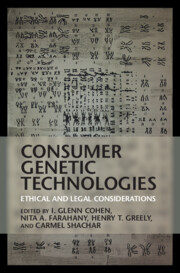Book contents
- Consumer Genetic Technologies
- Consumer Genetic Technologies
- Copyright page
- Contents
- Contributors
- Acknowledgments
- Introduction
- Part I Consumer Genetic Technologies: Rights, Liabilities, and Other Obligations
- Part II Privacy in the Age of Consumer Genetics
- Introduction to Part II
- 6 Noninvasive Prenatal Genome Sequencing
- 7 The Myth of “Anonymous” Gamete Donation in the Age of Direct-to-Consumer Genetic Testing
- 8 Improving Commercial Genetic Data-Sharing Policy
- 9 Genetic Paparazzi
- Part III Tinkering with Ourselves: The Law and Ethics of DIY Genomics
- Part IV Consumer Genetics and Identity
- Part V The Impact of Genetic Information
6 - Noninvasive Prenatal Genome Sequencing
Ethical and Policy Post-birth Implications
from Part II - Privacy in the Age of Consumer Genetics
Published online by Cambridge University Press: 27 August 2021
- Consumer Genetic Technologies
- Consumer Genetic Technologies
- Copyright page
- Contents
- Contributors
- Acknowledgments
- Introduction
- Part I Consumer Genetic Technologies: Rights, Liabilities, and Other Obligations
- Part II Privacy in the Age of Consumer Genetics
- Introduction to Part II
- 6 Noninvasive Prenatal Genome Sequencing
- 7 The Myth of “Anonymous” Gamete Donation in the Age of Direct-to-Consumer Genetic Testing
- 8 Improving Commercial Genetic Data-Sharing Policy
- 9 Genetic Paparazzi
- Part III Tinkering with Ourselves: The Law and Ethics of DIY Genomics
- Part IV Consumer Genetics and Identity
- Part V The Impact of Genetic Information
Summary
Non-Invasive Prenatal Testing (NIPT) allows testing fetal DNA in pregnant women’s blood early in pregnancy and can technically be used to sequence the whole genome of the fetus (NIPW). This chapter explores the implications of NIPW in cases where the pregnancy is not terminated, but rather a child is born about whom vast amounts of genetic information are known. To protect the child’s ‘open future’ parents usually do not have the right to genetically test minors for conditions unless they are childhood-affecting. If applied to NIPW, this reasoning means that information that is not clinically useful during pregnancy or childhood should not be disclosed. However, in the context of pregnancy, the fetus has no rights to privacy. On the other hand, some have argued that concerns about open future and autonomy are misguided, because genetic knowledge does not deprive a child of open future and because nobody possesses a ‘right not to know’ genetic information. These two opposing approaches demonstrate that NIPW requires a new conceptual framework. This chapter thus explores possible mechanisms that balance the reproductive autonomy of the pregnant woman against the interests of the prospective child and discusses their advantages and disadvantages.
- Type
- Chapter
- Information
- Consumer Genetic TechnologiesEthical and Legal Considerations, pp. 81 - 92Publisher: Cambridge University PressPrint publication year: 2021
- 1
- Cited by



